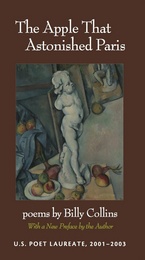
Bruce Weber in the New York Times called Billy Collins “the most popular poet in America.” He is the author of many books of poetry, including, most recently, The Rain in Portugal: Poems.
In 1988 the University of Arkansas Press published Billy Collins’s The Apple That Astonished Paris, his “first real book of poems,” as he describes it in a new, delightful preface written expressly for this new printing to help celebrate both the Press’s twenty-fifth anniversary and this book, one of the Press’s all-time best sellers. In his usual witty and dry style, Collins writes, “I gathered together what I considered my best poems and threw them in the mail.” After “what seemed like a very long time” Press director Miller Williams, a poet as well, returned the poems to him in the “familiar self-addressed, stamped envelope.” He told Collins that there was good work here but that there was work to be done before he’d have a real collection he and the Press could be proud of: “Williams’s words were more encouragement than I had ever gotten before and more than enough to inspire me to begin taking my writing more seriously than I had before.”
This collection includes some of Collins’s most anthologized poems, including “Introduction to Poetry,” “Another Reason Why I Don’t Keep a Gun in the House,” and “Advice to Writers.” Its success over the years is testament to Collins’s talent as one of our best poets, and as he writes in the preface, “this new edition . . . is a credit to the sustained vibrancy of the University of Arkansas Press and, I suspect, to the abiding spirit of its former director, my first editorial father.”
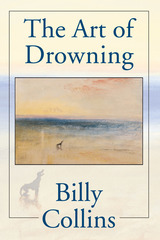
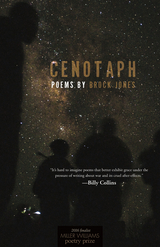
Finalist, 2016 Miller Williams Poetry Prize, edited by Billy Collins
Out of the contradiction, paradox, loss, and strange beauty of contemporary warfare, Brock Jones brings us Cenotaph, a collection of poems that have as their genesis Jones’s deployments to Iraq in 2002 and 2005, when he was in the US Army.
These are war poems, but also love poems and hate poems, poems about dying and living, poems about hope and hopelessness. These are poems that beautifully reflect Jones’s resignation to and rejection of the impossibility of saying anything definitive or honest about war.
These are poems that strive to do what poet Bruce Weigl described as the poet’s job: to find “some kind of miraculous way th at if you work hard enough to get the words right, that which you call horrific and wrong is defeated.”
Cenotaph is a poet doing the poet’s work: trying, hoping to get the words right.
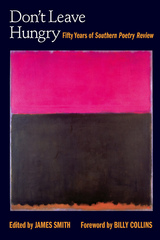
![front cover of [explicit lyrics]](https://www.bibliovault.org/thumbs/978-1-61075-581-8-thumb.jpg)
Winner, 2016 Miller Williams Poetry Prize, edited by Billy Collins
Randall Jarrell said that when you read a poem “you are entering a foreign country whose laws and language and life are a kind of translation of your own.” In [explicit lyrics], we are visitors to a world that is familiar as if the poems are occurring in our town, on the streets where we live. But the laws have changed, and what is normally important is no longer relevant. What was meaningless is now everything.
As the title indicates, these poems are lyrics—musings on the small decisions required by existence in the modern world. They contain the grand themes of art—life, love, and mortality—but not where you expect. The smallest and most mundane objects become the catalyst for reevaluating our roles in society and the world. This is not poetry as art. This is life as art, from a country where poetry is the only language.
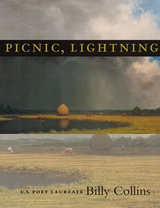
Over the past decade, Billy Collins has emerged as the most beloved American poet since Robert Frost, garnering critical acclaim and broad popular appeal. Annie Proulx admits, "I have never before felt possessive about a poet, but I am fiercely glad that Billy Collins is ours." John Updike proclaims his poems "consistently startling, more serious than they seem, they describe all the worlds that are and were and some others besides."
This special, limited edition celebrates Billy Collins's years as U.S. Poet Laureate. Picnic, Lightning--one of the books that helped establish and secure his reputation and popularity during the 1990s--combines humor and seriousness, wit and sublimity. His poems touch on a wide range of subjects, from jazz to death, from weather to sex, but share common ground where the mind and heart can meet. Whether reading him for the first time or the fiftieth, this collector's edition is a must-have for anyone interested in the poet the New York Times calls simply "the real thing."
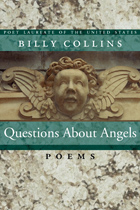
This special, limited edition celebrates Billy Collins's years as U.S. Poet Laureate. Questions About Angels--one of the books that helped establish and secure his reputation and popularity during the 1990s--is remarkable for its wry, inquisitive voice and its sheer imaginative range. Edward Hirsch selected this classic book for the National Poetry Series, and each of Collins's poems-from his meditation on forgetfulness to his musings on the behavior of angels-is an exploration of imaginative possibilities. Whether reading him for the first time or the fiftieth, this collector's edition is a must-have for anyone interested in the poet the New York Times calls simply "the real thing."
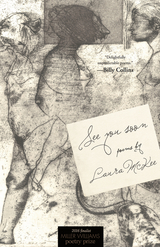
Finalist, 2016 Miller Williams Poetry Prize
The poems in See You Soon explore the limits of metaphor and language as their voices speak from the beauty and strangeness of daily experience, testing how we make sense of ourselves to ourselves and to one another. There is love in these poems, there is failure and absurdity. The characters, in their various situations and guises, find themselves outside of time, space, and identity—at sunset, in an airport, outside a hookah lounge, as a birthday party clown, after a flood. Its message is the invitation of the title. See You Soon is a statement of the complexity of our mutual direction in time, of camaraderie along the way.
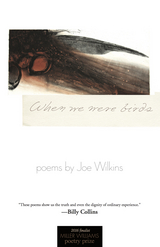
Finalist, 2016 Miller Williams Poetry Prize, edited by Billy Collins
In When We Were Birds, Joe Wilkins wrests his attention away from the griefs, deprivations, and high prairies of his Montana childhood and turns toward “the bean-rusted fields & gutted factories of the Midwest,” toward ordinary injustice and everyday sadness, toward the imminent birth of his son and his own confusions in taking up the mantle of fatherhood, toward faith and grace, legacy and luck.
A panoply of voices are at play—the escaped convict, the late-night convenience store clerk, and the drowned child all have their say—and as this motley chorus rises and crests, we begin to understand something of what binds us and makes us human: while the world invariably breaks all our hearts, Wilkins insists that is the very “place / hope lives, in the breaking.”
Within a notable range of form, concern, and voice, the poems here never fail to sing. Whether praiseful or interrogating, When We Were Birds is a book of flight, light, and song. “When we were birds,” Wilkins begins, “we veered & wheeled, we flapped & looped— / it’s true, we flew.”
Winner, 2017 Stafford/Hall Award for Poetry, Oregon Book Awards
READERS
Browse our collection.
PUBLISHERS
See BiblioVault's publisher services.
STUDENT SERVICES
Files for college accessibility offices.
UChicago Accessibility Resources
home | accessibility | search | about | contact us
BiblioVault ® 2001 - 2024
The University of Chicago Press









